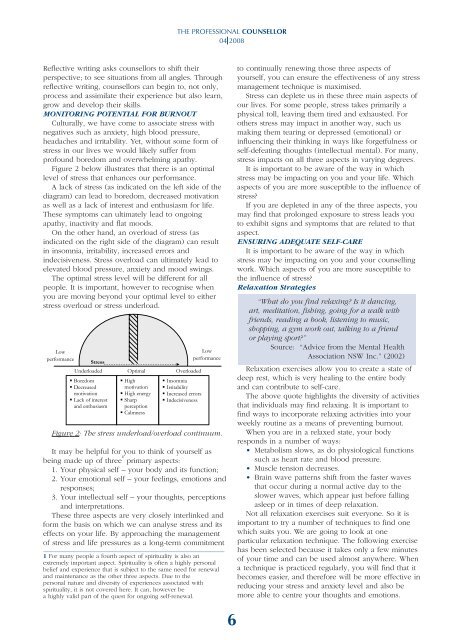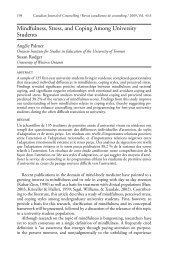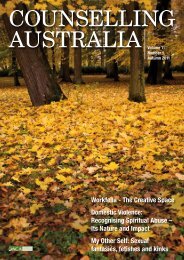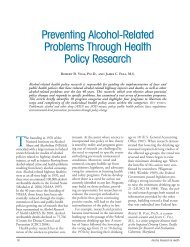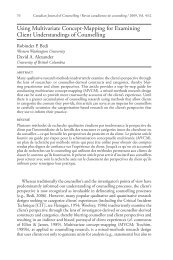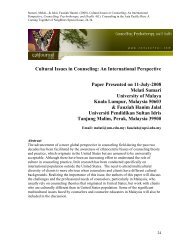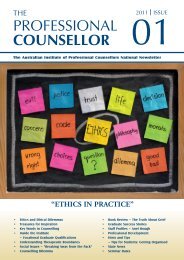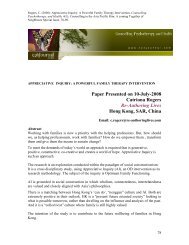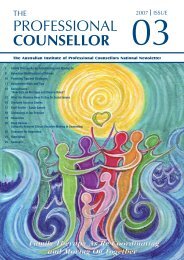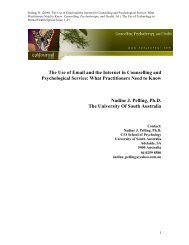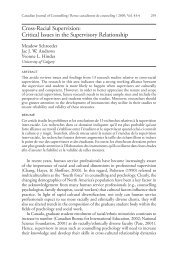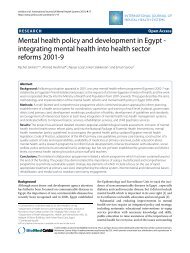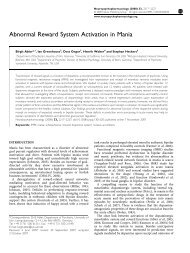Counselling Practice - Becoming a Reflective Practitioner
Counselling Practice - Becoming a Reflective Practitioner
Counselling Practice - Becoming a Reflective Practitioner
Create successful ePaper yourself
Turn your PDF publications into a flip-book with our unique Google optimized e-Paper software.
THE PROFESSIONAL COUNSELLOR<br />
04 2008<br />
<strong>Reflective</strong> writing asks counsellors to shift their<br />
perspective; to see situations from all angles. Through<br />
reflective writing, counsellors can begin to, not only,<br />
process and assimilate their experience but also learn,<br />
grow and develop their skills.<br />
MONITORING POTENTIAL FOR BURNOUT<br />
Culturally, we have come to associate stress with<br />
negatives such as anxiety, high blood pressure,<br />
headaches and irritability. Yet, without some form of<br />
stress in our lives we would likely suffer from<br />
profound boredom and overwhelming apathy.<br />
Figure 2 below illustrates that there is an optimal<br />
level of stress that enhances our performance.<br />
A lack of stress (as indicated on the left side of the<br />
diagram) can lead to boredom, decreased motivation<br />
as well as a lack of interest and enthusiasm for life.<br />
These symptoms can ultimately lead to ongoing<br />
apathy, inactivity and flat moods.<br />
On the other hand, an overload of stress (as<br />
indicated on the right side of the diagram) can result<br />
in insomnia, irritability, increased errors and<br />
indecisiveness. Stress overload can ultimately lead to<br />
elevated blood pressure, anxiety and mood swings.<br />
The optimal stress level will be different for all<br />
people. It is important, however to recognise when<br />
you are moving beyond your optimal level to either<br />
stress overload or stress underload.<br />
Low<br />
performance<br />
Stress<br />
Underloaded Optimal Overloaded<br />
Boredom<br />
Decreased<br />
motivation<br />
Lack of interest<br />
and enthusiasm<br />
High<br />
motivation<br />
High energy<br />
Sharp<br />
perception<br />
Calmness<br />
Insomnia<br />
Irritability<br />
Increased errors<br />
Indecisiveness<br />
Low<br />
performance<br />
Figure 2: The stress underload/overload continuum.<br />
It may be helpful for you to think of yourself as<br />
being made up of three 1 primary aspects:<br />
1. Your physical self – your body and its function;<br />
2. Your emotional self – your feelings, emotions and<br />
responses;<br />
3. Your intellectual self – your thoughts, perceptions<br />
and interpretations.<br />
These three aspects are very closely interlinked and<br />
form the basis on which we can analyse stress and its<br />
effects on your life. By approaching the management<br />
of stress and life pressures as a long-term commitment<br />
______________________________________________________________________<br />
1 For many people a fourth aspect of spirituality is also an<br />
extremely important aspect. Spirituality is often a highly personal<br />
belief and experience that is subject to the same need for renewal<br />
and maintenance as the other three aspects. Due to the<br />
personal nature and diversity of experiences associated with<br />
spirituality, it is not covered here. It can, however be<br />
a highly valid part of the quest for ongoing self-renewal.<br />
to continually renewing those three aspects of<br />
yourself, you can ensure the effectiveness of any stress<br />
management technique is maximised.<br />
Stress can deplete us in these three main aspects of<br />
our lives. For some people, stress takes primarily a<br />
physical toll, leaving them tired and exhausted. For<br />
others stress may impact in another way, such us<br />
making them tearing or depressed (emotional) or<br />
influencing their thinking in ways like forgetfulness or<br />
self-defeating thoughts (intellectual mental). For many,<br />
stress impacts on all three aspects in varying degrees.<br />
It is important to be aware of the way in which<br />
stress may be impacting on you and your life. Which<br />
aspects of you are more susceptible to the influence of<br />
stress<br />
If you are depleted in any of the three aspects, you<br />
may find that prolonged exposure to stress leads you<br />
to exhibit signs and symptoms that are related to that<br />
aspect.<br />
ENSURING ADEQUATE SELF-CARE<br />
It is important to be aware of the way in which<br />
stress may be impacting on you and your counselling<br />
work. Which aspects of you are more susceptible to<br />
the influence of stress<br />
Relaxation Strategies<br />
“What do you find relaxing Is it dancing,<br />
art, meditation, fishing, going for a walk with<br />
friends, reading a book, listening to music,<br />
shopping, a gym work out, talking to a friend<br />
or playing sport”<br />
Source: “Advice from the Mental Health<br />
Association NSW Inc.” (2002)<br />
Relaxation exercises allow you to create a state of<br />
deep rest, which is very healing to the entire body<br />
and can contribute to self-care.<br />
The above quote highlights the diversity of activities<br />
that individuals may find relaxing. It is important to<br />
find ways to incorporate relaxing activities into your<br />
weekly routine as a means of preventing burnout.<br />
When you are in a relaxed state, your body<br />
responds in a number of ways:<br />
• Metabolism slows, as do physiological functions<br />
such as heart rate and blood pressure.<br />
• Muscle tension decreases.<br />
• Brain wave patterns shift from the faster waves<br />
that occur during a normal active day to the<br />
slower waves, which appear just before falling<br />
asleep or in times of deep relaxation.<br />
Not all relaxation exercises suit everyone. So it is<br />
important to try a number of techniques to find one<br />
which suits you. We are going to look at one<br />
particular relaxation technique. The following exercise<br />
has been selected because it takes only a few minutes<br />
of your time and can be used almost anywhere. When<br />
a technique is practiced regularly, you will find that it<br />
becomes easier, and therefore will be more effective in<br />
reducing your stress and anxiety level and also be<br />
more able to centre your thoughts and emotions.<br />
6


